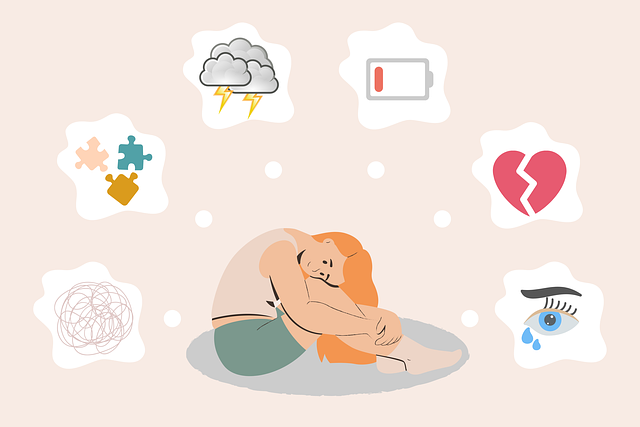Aurora Cognitive Behavioral Therapy (CBT) is an evidence-based approach to emotion regulation that teaches individuals to manage their emotions effectively through challenging negative thought patterns and adopting adaptive coping mechanisms. Integrated into services like Trauma Support and Mental Illness Stigma Reduction, CBT enhances emotional intelligence, reduces stress levels, improves relationships, and boosts resilience. By incorporating techniques such as mindfulness meditation and cognitive reappraisal, CBT empowers clients to maintain mental health, prevent depression, and foster overall well-being, making it a key component of mental wellness initiatives.
Emotion regulation is a vital skill, enabling individuals to navigate life’s challenges with resilience and adaptability. This article explores effective strategies for teaching emotion regulation techniques, focusing on the benefits of Aurora Cognitive Behavioral Therapy (CBT). CBT offers a structured approach to understanding emotions, identifying triggers, and developing healthy coping mechanisms. By integrating practical strategies into daily routines, readers can enhance emotional well-being and foster a more balanced life.
- Understanding Emotion Regulation and Its Benefits
- The Role of Aurora Cognitive Behavioral Therapy (CBT) in Teaching Emotion Regulation Techniques
- Practical Strategies for Incorporating Emotion Regulation Skills into Daily Life
Understanding Emotion Regulation and Its Benefits

Understanding emotion regulation is a pivotal step toward fostering emotional intelligence and enhancing overall well-being. It involves recognizing, managing, and responding to our emotions in healthy and constructive ways. Aurora Cognitive Behavioral Therapy (CBT) offers valuable tools for navigating this process by helping individuals challenge negative thought patterns and replace them with more adaptive coping mechanisms. This approach not only empowers people to better understand their emotional responses but also equips them with strategies to regulate and express emotions effectively, leading to improved mental health and reduced stress levels.
The benefits of mastering emotion regulation are far-reaching, impacting various aspects of life. It facilitates healthier relationships by promoting empathy and understanding towards oneself and others. Moreover, it aids in trauma support services, enabling individuals to process and heal from past experiences. By integrating emotional healing processes into daily routines, folks can boost their resilience and overall quality of life, making emotion regulation a game-changer for personal growth and fulfillment.
The Role of Aurora Cognitive Behavioral Therapy (CBT) in Teaching Emotion Regulation Techniques

Aurora Cognitive Behavioral Therapy (CBT) plays a pivotal role in teaching emotion regulation techniques by focusing on identifying and modifying unhelpful thought patterns and behaviors. This therapeutic approach empowers individuals to understand their emotions, challenge negative beliefs, and adopt more adaptive coping strategies. Through CBT, clients learn to recognize triggers, develop effective stress management skills, and enhance their overall emotional resilience.
The methodical nature of Aurora CBT ensures that emotion regulation becomes a practical, everyday skill. By integrating evidence-based techniques into their lives, individuals can effectively navigate and manage their emotions, even in the face of challenging situations. This not only contributes to improved mental wellness but also plays a crucial role in Trauma Support Services, Mental Illness Stigma Reduction Efforts, and the overall well-being of those seeking to enhance their emotional intelligence and life satisfaction through the Mental Wellness Podcast Series Production.
Practical Strategies for Incorporating Emotion Regulation Skills into Daily Life

Incorporating emotion regulation skills into daily life is a crucial aspect of maintaining good mental health, and Aurora Cognitive Behavioral Therapy (CBT) offers practical strategies to achieve this. Techniques like mindfulness meditation and cognitive reappraisal can help individuals manage their emotions effectively. By starting the day with a short mindfulness exercise, one can cultivate present-moment awareness, enabling better emotional control throughout the day. This simple practice has been shown to reduce stress and improve overall well-being.
Additionally, identifying and challenging negative thought patterns is an essential skill taught in CBT. Encouraging clients to question and reframe their thoughts can lead to more balanced emotions. For instance, instead of dwelling on failures, individuals can learn to view them as learning opportunities, fostering resilience. Self-care routine development, including regular exercise and adequate sleep, also plays a vital role in depression prevention and overall mental health. Integrating these practices into daily routines allows for better emotional regulation and enhanced quality of life.
Emotion regulation is a powerful tool for enhancing mental well-being, and the Aurora Cognitive Behavioral Therapy (CBT) approach offers a comprehensive framework. By understanding the benefits of emotion regulation and implementing practical strategies, individuals can effectively navigate their emotional landscape. This article has explored the significance of CBT techniques in teaching emotion regulation skills, providing a roadmap for personal growth and improved quality of life. Incorporating these insights into daily routines can lead to better stress management, enhanced resilience, and overall mental health.














